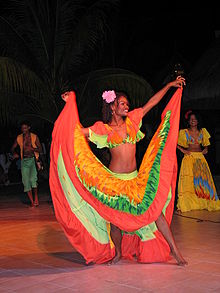This article has multiple issues. Please help improve it or discuss these issues on the talk page. (Learn how and when to remove these messages)
|
 Two female Sega music dancers (center and right) from Mauritius. Two female Sega music dancers (center and right) from Mauritius. | |
| General Statistics | |
|---|---|
| Maternal mortality (per 100,000) | 53 (2020) |
| Women in parliament | 20% (2020) |
| Women over 25 with secondary education | 45.2% (2010) |
| Women in labour force | 50% (2018) |
| Gender Inequality Index | |
| Value | 0.347 (2021) |
| Rank | 82nd out of 191 |
| Global Gender Gap Index | |
| Value | 0.679 (2022) |
| Rank | 105th out of 146 |
Women in Mauritius refers to the social demographic of women in Mauritius. Women's role in Mauritian society changed throughout the 20th century. Historically, Mauritian culture maintained patriarchal power structures, in domains inclusive of family and work life. Women's contribution in the workforce increased due to the creation of 'Export Processing Zone', by the Mauritian Government. This shift resulted in a surge in 'dual-earner' and working single-mother households.
Furthermore, in 2008, Mauritius established the Employment Rights Act. The Act forbids discrimination within the workplace and stipulates equal remuneration for work of equal value. Both females and males, regardless of their marital status, have the legal right to choose their own profession, in Civil Code and under The Act.
Parliament
In the postcolonial era, women in Mauritius experienced the impacts of colonialism. During the 19th-century Mauritian law stated that women should be treated as the inalienable property of their husbands. The government then repealed laws that they view deal with inheritance and emigration. In 1989, the government appointed equal opportunity officers in the principal ministries for issues related to women. The Ministry of Women's Rights and Family Welfare reports indicate some improvement in issues relating to discrimination.
Some developments in Parliament include Mrs Ameena Gurib-Fakhim accession to the presidency (from 2015 to 2018), as well as, Hon.Mrs Maya Hanoomanjee's attainment of the position of the first woman Speaker in 2014.
Events
In 2016, the Ministry of Gender Equality requested the withdrawal of an advertisement by Coca-Cola which was considered "sexist" due to a complaint from a gender consultant. In March 2018, a new law was established to form the National Women’s Council as a platform for women to voice out their needs and aspirations. In order to address issues like violence against women, trafficking of women, and the promotion and protection of rights to sexuality and sexual and reproductive health, in May 2018, a joint monitoring framework agreement on the gender action plan was signed with the European Union.
Indices of Development
Economic
In Mauritius, working age females (15+) have an unemployment rate of 10%. The percentage of women in senior positions, such as: Senior Chief Executive, Permanent Secretary and Deputy Permanent Secretary, increased from 23% in 2001 to 40% in 2016. The international conference in August 2018, produced a declaration on women’s economic empowerment in addition to a work plan on the priority areas of the Indian Rim Association to significantly contribute to women’s economic empowerment.
Education
The proportion of students progressing from primary cycle to secondary cycle in 2011 was 79% for boys and 84% for girls.
Gender
In 2013, Mauritius' Gender Inequality Index was 0.375. According to Ms. Jeewa-Daureeawoo, it has been stated Mauritius is on the right track to eliminating discrimination against women.
References
![]() This article incorporates text from this source, which is in the public domain. Country Studies. Federal Research Division. (Data as of 1994.)
This article incorporates text from this source, which is in the public domain. Country Studies. Federal Research Division. (Data as of 1994.)
- "Human Development Report 2021/2022" (PDF). HUMAN DEVELOPMENT REPORTS. Retrieved 23 November 2022.
- "Global Gender Gap Report 2022" (PDF). World Economic Forum. Retrieved 27 February 2023.
- "Successful women in Mauritius". 14 June 2022.
- Mauritius Women in Culture, Business, & Travel. California: World Trade Press. 2010. p. 1.
- Blin, Myriam (June 2008). "Export-Oriented Policies, Women's Work Burden and Human Development in Mauritius" (PDF). Journal of Southern African Studies. 34 (2): 239–253. doi:10.1080/03057070802037910. S2CID 154132063.
- "Mauritius" (PDF). OECD DEVELOPMENT CENTRE. 2019.
- "Mauritius" (PDF). 2019.
- Vlcek, William (2019-01-02). "The Mauritian Paradox: Fifty Years of Development, Diversity and Democracy". The Round Table. 108 (1): 104–106. doi:10.1080/00358533.2019.1565351. ISSN 0035-8533. S2CID 159199613.
- Ramtohul, Ramola (2020-07-30). "Women in Mauritius". Oxford Research Encyclopedia of African History. doi:10.1093/acrefore/9780190277734.013.528. ISBN 9780190277734. Retrieved 2020-10-27.
- Gokulsing, Deepa (2014). "Gender, education and labour market: evidence from Mauritius". International Journal of Sociology and Social Policy. 34 (9/10): 609–633. doi:10.1108/IJSSP-01-2013-0001. Retrieved 10 April 2021.
- Calder, Angus (2003). "A man for all cultures: the careers of learie constantine". Culture, Sport, Society. 6 (1): 19–42. doi:10.1080/14610980312331271469. ISSN 1461-0981. S2CID 145776720.
- "Dr. Ameenah Gurib-Fakim".
- "H.e. Santi Bai Hanoomanjee".
- "Mauritius Is Known For Encouraging Women To Work At Higher Positions". International Television Network. 11 February 2017. Retrieved 9 April 2021.
- ^ "OHCHR | Committee on the Elimination of Discrimination against Women reviews the report of Mauritius". www.ohchr.org. Retrieved 2020-10-27.
- UN Women (2020). "Mauritius". UN Women - Women Count.
- "Statistics Mauritius". Mauritius Government. Retrieved 10 April 2021.
- DefiMedia (2016). "Pub de Coca-Cola : le ministère de l'Égalité des genres fait marche arrière". Le Defi Media Group (in French). Retrieved 2020-10-27.
- UNDP (2020). "Gender Inequality Index". UNITED NATIONS DEVELOPMENT PROGRAMME -Human Development Reports.
External links
| Women in Africa | |
|---|---|
| Sovereign states |
|
| States with limited recognition | |
| Dependencies and other territories |
|
| Mauritius articles | ||||||||||||||
|---|---|---|---|---|---|---|---|---|---|---|---|---|---|---|
| Subdivisions |
|  | ||||||||||||
| Politics | ||||||||||||||
| Economy | ||||||||||||||
| Society |
| |||||||||||||
